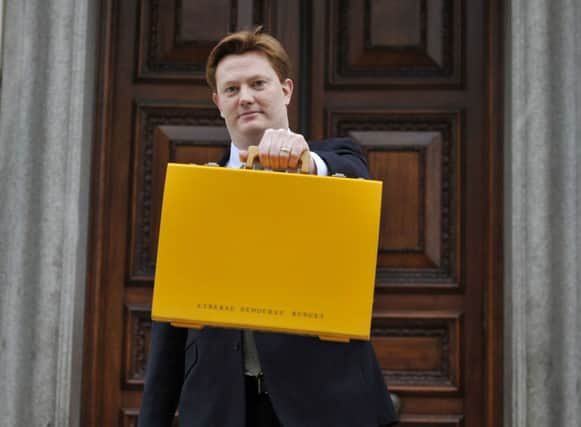Euan McColm: Danny Alexander is fooling no-one


But when Danny Alexander looked to his left, Vince wasn’t there. The Chief Secretary to the Treasury was all alone, in his sober suit, holding aloft a bright yellow briefcase, and looking like a thwocking great ninny.
I confess that I completely fabricated Alexander’s words, as reported above, for the purposes of taking a cheap dig at him. But who could blame me after his post-Budget day stunt, which was as bizarre as it was pitiful?
Advertisement
Hide AdAdvertisement
Hide AdWhen Conservative Chancellor George Osborne outlined the Budget on Wednesday, Alexander was there on the front benches, supporting his coalition partner (and boss) every step of the way.
For every boo from the opposition benches, Alexander had a “hear hear” in support of Osborne. They were both in this budget thing together.
Yet 24 hours later, Alexander had (sort of) changed his tune.
Alexander returned to the Commons to outline what he described as a “better plan”. Yes, he told those MPs who’d bothered to turn up, he had co-written the budget announced by Osborne the day before and, yes, he would be voting in support of all the measures contained therein, but there was another way, a fairer way.
Alexander told MPs that the Lib Dems, unfettered by Tory influence, would have cut less than Osborne planned to. The brain fairly fizzed trying to process that one. If Alexander was the co-author of the budget and if he backed all it proposed, then how … why … what?
To the casual observer, this seemed a desperate bit of Lib Dem campaigning dressed up as a ministerial announcement. Commons speaker John Bercow seemed concerned that this was exactly what it was and reminded Alexander that making party political pitches from the Government benches was not on.
This wasn’t the case, said Alexander (though it pretty clearly was) because the alternative plans he was about to describe had been produced by Treasury officials using information from the Office of Budget Responsibility.
This appeared to be an acceptable explanation – though cynics might ask why civil servants had been asked to spend their time drawing up proposals that would never be put into practice.
Advertisement
Hide AdAdvertisement
Hide AdThe gist of Alexander’s “better plan” was that the Lib Dems would do things much the same as they had done in partnership with the Conservatives but they’d also raise more money by cracking down on tax evaders while stinging the better off for a few bob more, too.
The Lib Dem plan would mean a brighter future for all, whereas the Budget announced by Osborne (and we should remember, even if he appeared not to, that Alexander had just spoken of his ownership of and support for that budget) would take public spending back to levels last seen more than 50 years ago.
This was all hugely confusing, with Alexander attempting both to embrace and distance himself from the Budget he had co-authored.
We could spend a great deal of time looking for nuance, here. We could do that if the reason for Alexander’s weird post-Budget “Budget” wasn’t so blindingly obvious. The Lib Dems are in a terrible state of panic.
Cast your minds back five years and Nick Clegg’s party was in an enviable position. Clegg was the common-sense voice of the general election campaign, unencumbered by any kind of track record in power, able to be all things to all people.
The Lib Dems appealed to those voters who’d grown weary of the Labour-Tory wars and wanted something more constructive, more thoughtful.
When the 2010 election ended with no party holding an overall majority, what choice did Clegg and company have but to step up and agree a coalition deal? Had the Lib Dems failed to do so, then they’d have been – quite rightly – dismissed as being all mouth and no trousers.
But the price for dealing with the Tories has been great. The Lib Dems face wipeout in Scotland, with the SNP on course to take all of the party’s 11 seats (which would mean an end to any kind of parliamentary appearances by Alexander) and, in England, polls show that Labour and the Greens look likely to pick up many of those voters who famously declared “I agree with Nick” five years ago.
Advertisement
Hide AdAdvertisement
Hide AdThe Lib Dems have lost their identity. They might argue that their presence in government has tempered the worst excesses of cruel old Toryism but that’s not the story voters hear. Instead, a great many of those who supported the Lib Dems (and remember, this is the party that the none-more-right-on Guardian recommended its readers support) see them as sell-outs, willing to prop up the detested Conservatives in return for a whiff of power.
The Lib Dems have spent the past two days in conference in Aberdeen. Trying to rally his troops (or dwindling band of optimists), Clegg said we would all be surprised by the success to come in May, not only in England but in Scotland, too.
This, of course, is exactly what we would have expected him to say. He could hardly stand up and proclaim “we’re doomed”, though the polls clearly suggest that’s the case.
The Chief Secretary of the Treasury left the Commons on Thursday after his what-could-have-been Budget to pose holding a ministerial box. Instead of the traditional red, it was Lib Dem yellow. It looked like the sort of thing an aunt might give a child at Christmas; inside, perhaps, dozens of felt-tip pens or a my first doctor dressing up kit.
To their credit, the Lib Dems agreed a coalition deal in 2010 when the British electorate decreed this necessary if a government was to be formed.
But, having gone into power with the Tories, Danny Alexander can’t now credibly distance himself from spending plans covered with his own fingerprints. What does he take us for? Children? «